Generative AI in SEO: How Search is Changing & Conductor's POV
- Thought Leadership
- By Wei Zheng
- 13 minutes read
Conductor’s Chief Product Officer, Wei Zheng, shares her take on how generative AI is changing SEO and its role in our product strategy.
On May 14, 2024, Google announced the roll out of AI Overviews (formerly part of Search Generative Experience, or SGE) in the U.S. Check out our most recent blog article for six strategies to help navigate this new development given what we know so far, covering E-E-A-T, content and ranking shifts, and more.
It’s no secret that things are rapidly changing in the SEO industry and overall search landscape with the rise of generative AI and Google’s Search Generative Experience (SGE) announcement . At the first stop on our customer-focused C3 2023 Live Roadshow , we asked how everyone in the audience was feeling about AI—the top two words that came back were: excited and nervous.
These feelings align with the most common sentiments from the conversations I’ve been having with customers over the last few months; everyone agrees that AI has unlimited potential, but also feels unsettled by the uncertainty ahead.
While change is nothing new in SEO, what’s happening with AI right now feels different from the normal rate of change digital marketers are accustomed to. After all, content creation and optimization are at the heart of SEO, which is the direct use case the latest generative AI technology supposedly enables. Many customers are curious if SEO will remain relevant and how they will get found if AI-generated results take over the top rankings on SERPs. They want to know whether keywords will still be important if search engines stop using them as the primary way to identify user intent.
While these are all valid concerns and questions to have, periods of significant change also provide new opportunities to greatly enhance productivity, effectiveness, and capabilities. I would argue there has never been a better time to be a digital marketer; the bar has been raised, and we have more power at our disposal than ever before. Conductor recently shared our vision to transform our enterprise SEO platform with AI . I wanted to follow up with my take on what’s changing in SEO (and what’s not), along with a deeper dive into how Conductor is leveraging AI to solve our customers’ problems faster and more efficiently.
How is AI changing SEO?
Let’s look at what will likely change the most in SEO as AI continues to gain widespread adoption and search giants like Google prioritize AI-powered innovations.
SERPs meet SGE
You may have already gotten a taste of some coming changes to SERPs if you live in the U.S. Google has been incrementally rolling out a new experiment known as the Search Generative Experience (SGE) . This update is currently in experiment mode; users have to opt-in to access it. Once enabled on your Google account in Search Labs, you will see a new SERP snippet type sourced via Google’s generative AI technology, which appears directly above the top-ranking organic results.
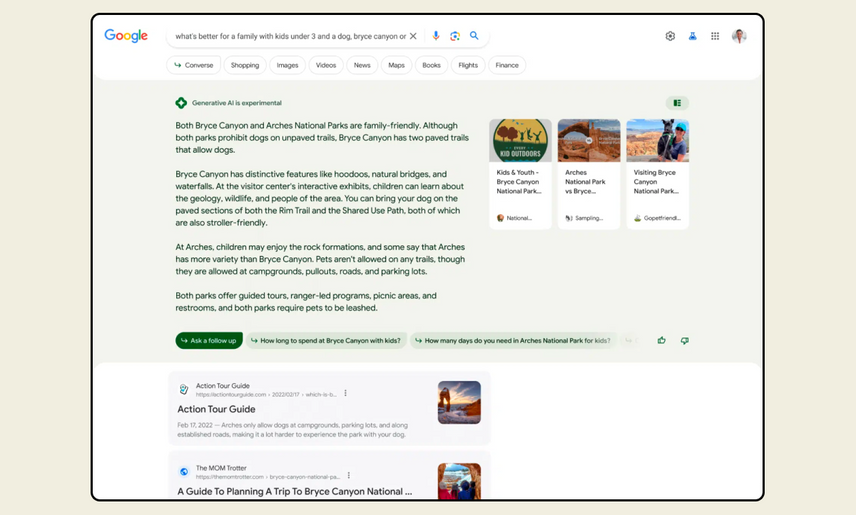
A few things worth noting related to SGE’s functionality:
- The content that’s generated in this snippet summarizes content from attributable sources. In other words, AI is not creating net new content; it’s simply aggregating and interpreting existing, published content.
- It shows the source websites that the answer was generated from. While these are almost always unpaid, organic content links, it should be noted that it's not always clear what content was sourced from each page.
- It lists additional related searches as a form of follow-up questions (in addition to the People Also Ask snippet), which helps users refine in real-time.
These SERP changes may seem daunting, but they aren’t an entirely new concept to SEOs and search experts. A few SEOs I spoke with have referred to this as “Google Answer Box on steroids.” When it works well, it’s pretty exciting for the end user, as they get immediate help without having to read or click on all the top content in the first few search results.
For content publishers and brands looking to increase their reach and be found online organically, this presents some new challenges and opportunities. AI summarizes the content and provides answers but still needs accurate input. That input relies on the content that brands and publishers create. A big part of this experience is going to hinge on trust. Users will have to trust that Google is providing accurate, reliable information and attribution on the source of the information. So in many ways, the organic content you’re creating and optimizing for SEO remains the true source of wisdom and intelligence for users.
Content creation surge
As SERPs evolve, the way people create content will also change. The popularity of generative AI will produce an explosion of content. When a machine can generate content much faster than a human, you can guarantee more content will be produced. But we all know more content doesn’t mean more quality content. In recent months there has been a flood of new AI-powered tools aimed at helping users automate their content creation workflow from ideation to SEO optimization. This will inevitably yield more noise, meaning your original content will be harder to find if not optimized and invested in further.
Conductor’s R&D team continuously monitors the latest changes in the SERP landscape. While there will likely be many iterations of SGE and broader search experiences in the months and years to come, we remain committed to providing you with the most up-to-date, relevant, and actionable insights in our enterprise SEO platform alongside each stage of evolution.
The primary purpose of SEO remains the same—despite AI
While many things are changing for search and SEO, many core foundational SEO elements remain the same. One thing I think we can all agree on is that search is more prevalent than ever. More people are looking for more help in more places. How you are showing up or, rather, where you aren’t showing up when your target audience is looking for help matters more now than ever before. Search optimization isn’t about optimizing the search engine or the algorithms of search engines. It’s about optimizing and driving value from the wisdom that you provide through your content.
The only algorithm that matters is the heart, mind, and soul of your customer.
This heartfelt quote from our CEO Seth Bethmertnik is one that has stayed with me. All the search engine changes driven by AI only further validate this stance. It’s not about making or optimizing content to rank higher in Google search. The primary objective in SEO continues to be creating content that’s helpful to customers and answers their questions.
Creating helpful and meaningful content requires purposeful investment. If you don’t invest in it, your organic visibility will decline, which means lost customers, leads, traffic, and more. This remains as true today as it was ten or twenty years ago, perhaps with even more urgency than before.
Additionally, actionable insights and data remain the foundation to inform decisions by digital marketers. No matter what changes are in store for the future of search, you will always need more holistic data-driven analysis and intelligent recommendations to help you succeed.
Unlocking the future of Conductor’s product with a strong AI foundation
During industry-wide transformation, people often view technology as a disruptive force and the primary source of the chaos. In reality, technology helps all of us, especially during times of uncertainty.
While product makers and software creators are always tempted to follow the latest trend or buzz around what’s new and exciting, I’m proud to say that AI applications, such as machine learning (ML) and natural language processing (NLP), have been a staple in Conductor’s core product development for quite some time already. Today, we are increasing our investment in leveraging the latest AI technology to further improve all aspects of our enterprise SEO platform.
At the same time, our experience has taught us that solutions created or implemented too far in advance of the real needs and problems of our customers can be confusing and distracting. We can’t be 100% sure how the search landscape will change and the true impact of AI in SEO for quite some time, but we can choose how we invest in our core technical product foundations to ensure they are as adaptable as possible to future changes.
With this in mind, we are hyper-focused on three core objectives for Conductor’s product foundation: Data, Intelligence, and User Experience. We are investing aggressively in each of them.
Data
With Conductor, we help uncover and curate insights about your customers, competitors, and the search visibility performance of published content. Then, we help surface intelligent SEO recommendations and opportunities that provide the highest ROI. Our Data Platform, a key long-term investment area for us, underpins these areas of functionality. Our goal with the Data Platform is to create the most comprehensive search data environment in the industry.
We are already integrating data signals from analytics, keywords, social media, and technical website changes in real-time . And this data foundation can expand far beyond the current set of signals—no matter where they come from. This includes signals from search intent via paid channels, keyword topic clusters, natural language queries like the conversational signals from SGE, etc. The possibilities are endless.
We also know that modern enterprises want this data in their own systems, and we want to grant you that access through our next-generation data API in addition to our platform.
But it’s not just about the data itself; it’s also about how a user can interact with it to get the most value possible from the data. This is one of the areas within our platform that I’m most excited about applying generative AI technology. We are working on ways to automatically detect anomalous changes in your search data signals and proactively alert you about them.
We are also investing in a more customizable and flexible reporting interface where users can choose what they want to analyze from a broader list of data dimensions or simply use natural language to ask a question of their data and get immediate results.
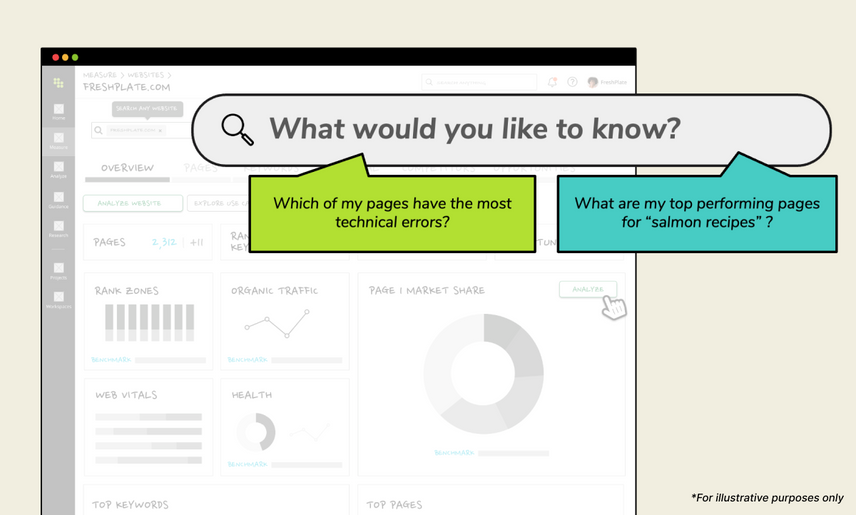
Intelligence
Another core foundational piece of our product strategy is the intelligence layer we have been building from the beginning at Conductor. Content Guidance, one of our platform’s most beloved features, already incorporates several AI and ML techniques to bring you actionable recommendations so you can learn the best ways to optimize your content.
Our vision doesn’t stop there. As democratized access to free and open-source generative AI models, like ChatGPT from OpenAI, expands, we are challenging ourselves to bring our customers more value by significantly enhancing our intelligence capabilities—rather than re-packaging our current experience in a shiny new UI like some of our competitors have done and calling it a day.
We plan to accomplish this by increasing investments in generative AI and large language models (LLMs), which can intake massive amounts of data and are trained to recognize patterns and make predictions to generate outputs to various questions and prompts in a human-like manner. Our focus centers on three distinct areas:
- Prompt engineering: This enables the ability to ask better and more nuanced questions of the AI model. This may seem trivial, but we want to take out the tedious work of experimenting with open-source AI models, so we are always asking the most relevant question with the precise context.
- Model tuning: While open-source models provide a lot of value out of the box, we aim for our models to be further configured and tuned to meet specific and personalized needs.
- Data/Text Embedding: Generative AI becomes way more powerful when we can augment the models with additional data specific to the context and problems we want to solve.
We are starting to experiment with these core enhancements via a new exciting set of capabilities coming soon to our SEO platform. One example is active development around a new Writing Assistant feature in Conductor that surfaces SEO insights and content recommendations while you write to help you make your content as valuable as possible before you publish. Get guidance around SEO ranking factors and human factors, like how well your content answers the questions they’re asking.
With Questions to Answer, we use AI to surface how well your content addresses or answers the People Also Ask Questions on Google. Reminder: Answering these questions will help you show up for those related queries, expanding the reach and efficiency of your content.
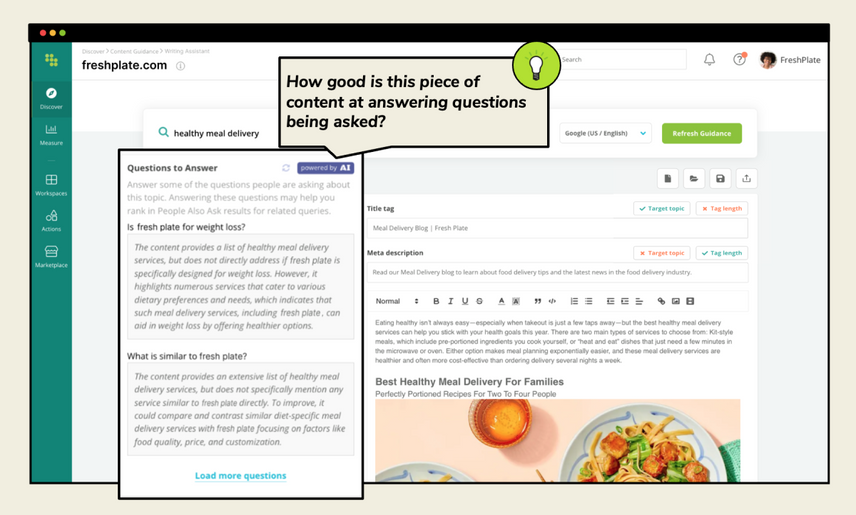
User Experience
Rounding out our product strategy foundation is building a best-in-class user experience. As data and technology become more and more democratized and made accessible, the most significant barrier to unlocking value and adoption always comes down to ease of use. We continue to view platform UX as one of the most critical pieces of our overall product vision and roadmap.
With AI, a big part of the user experience is automation, especially of tedious, time-intensive tasks that distract users from value creation. We want to bring this into the product so there’s always a personalized and guided experience, regardless of a user’s SEO experience or product knowledge.
We want to make it easier for every user to get started independently, find value fast, answer questions from your data, and act on intelligent recommendations—without needing a go-to power user. I believe this is more important than any other feature. To accomplish this, we’re implementing a more intuitive and personalized “getting started” experience based on a user’s specific needs and goals that they specify on their first login.
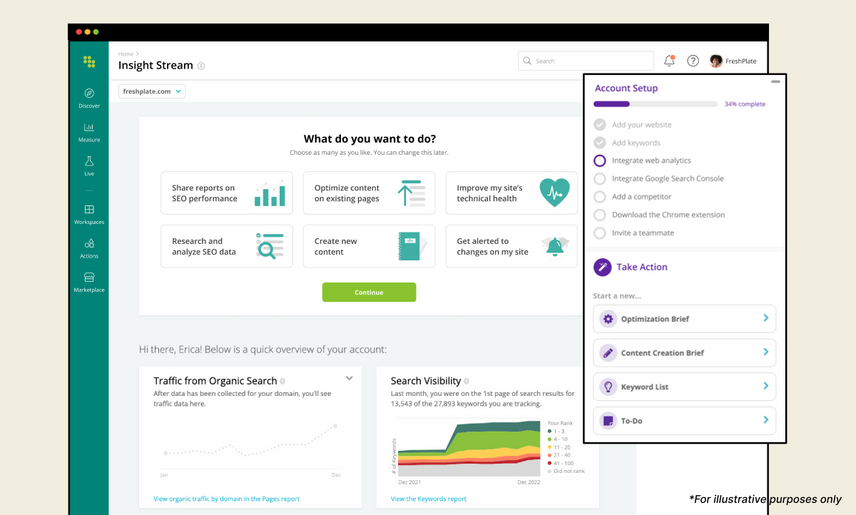
Help us shape our collective SEO future together
Simply put, the SEO landscape is entering a new transformative era, driven by the rise of generative AI and Google's SGE. But the foundational elements of SEO remain unchanged. Search continues to be more prevalent than ever, and showing up where your potential users are looking remains a top priority for enterprises to fuel growth. You can thrive in this evolving landscape by creating meaningful, helpful content and investing in intent-driven, value-focused SEO efforts.
Our approach at Conductor focuses on embracing AI to enhance our enterprise SEO platform and to deliver value based on our customers’ specific needs. We're investing heavily in how we leverage AI across Data, Intelligence, and User Experience to make that possible. Our vision moves beyond keeping pace with the latest trends. Our focus is on shaping the future of SEO through innovation and adaptability.
As we move forward, we welcome your feedback and collaboration to shape the collective future of SEO together. Stay engaged by signing up for our monthly newsletter to get the latest Conductor news and updates, or book a free demo to see the current Conductor platform in action and let us know your thoughts. Together, we can navigate the changes and seize the new opportunities that AI brings to the world of SEO.
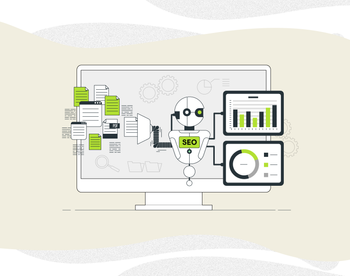
![Seth Besmertnik, CEO and Co-Founder, [object Object]](https://cdn.sanity.io/images/tkl0o0xu/production/79e6eda2a43959d9ac71253ccff188677b8260d8-3542x3542.png?fit=min&w=100&h=100&dpr=1&q=95)






